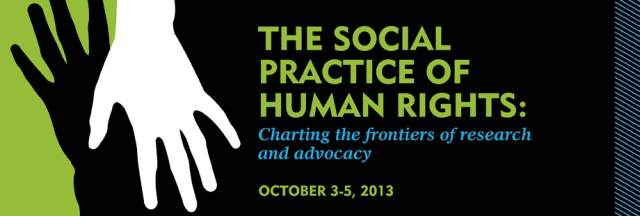Hydraulic Fracturing in the Great Miami River Watershed: A Human Rights Issue?
Location
River Campus - Room M2225
Start Date
10-4-2013 9:30 AM
Abstract
This paper will provide a general definition and overview of the practice of hydraulic fracturing. Then it will describe the direct challenges and issues the Dayton region and the Great Miami River Watershed are faces from this practice. We will conduct interviews with officials from government and non-governmental organizations—such as the Miami Conservancy District, the City of Dayton Department of Water, Ohio Citizens Action Network, Advocates for Basic Legal Equality and the Dayton Environmental Advisory Board—to determine what actions are being taken to address the challenges and issues and what types of organizations are taking the lead. The human-rights criteria to be applied will be determined based on relevant literature as well as interviews of public officials and other pertinent organizations. Finally, these hydro-fracking concerns in the region will be evaluated with respect to affects on civil, political, economic, social and/or cultural rights (as applicable). In conclusion, suggestions will be made for how to best address the region’s hydraulic fracturing challenges and issues with a human-rights based approach.
Hydraulic Fracturing in the Great Miami River Watershed: A Human Rights Issue?
River Campus - Room M2225
This paper will provide a general definition and overview of the practice of hydraulic fracturing. Then it will describe the direct challenges and issues the Dayton region and the Great Miami River Watershed are faces from this practice. We will conduct interviews with officials from government and non-governmental organizations—such as the Miami Conservancy District, the City of Dayton Department of Water, Ohio Citizens Action Network, Advocates for Basic Legal Equality and the Dayton Environmental Advisory Board—to determine what actions are being taken to address the challenges and issues and what types of organizations are taking the lead. The human-rights criteria to be applied will be determined based on relevant literature as well as interviews of public officials and other pertinent organizations. Finally, these hydro-fracking concerns in the region will be evaluated with respect to affects on civil, political, economic, social and/or cultural rights (as applicable). In conclusion, suggestions will be made for how to best address the region’s hydraulic fracturing challenges and issues with a human-rights based approach.




Comments
This biennial conference provides a unique space for scholars, practitioners and advocates to engage in collaboration, dialogue and critical analysis of human rights advocacy — locally and globally. Learn more about the Human Rights Center at the University of Dayton >>>.